Profile: 'After Hours' Works the Late Shift on Cracked.com
 |
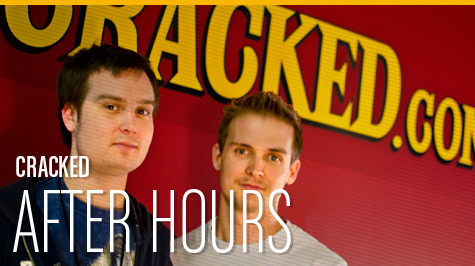 |
|||||||
Cracked.com, the most visited humor website in the world, provides a fascinating case study for the evolution of publishing and the explosive reach of the Internet. Founded as a print competitor to Mad Magazine in 1958, it reached a peak circulation of about 500,000, but then folded in 2007. Compare that print circulation to today’s 300 million monthly web page views, and you get a sense of the power of the Internet for reaching a niche audience. Original programming is part of the appeal of Cracked.com, and the site’s video web series After Hours is one of its most popular. We connected with the show’s stars (and Cracked.com staffers) Soren Bowie, Michael Swain, and Dan O’Brien to learn a bit more about the show and force them to answer our SAT-style analogies. |
||||||||
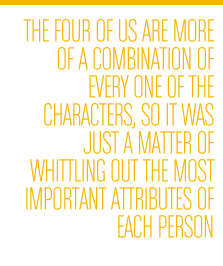 |
|
|||||||
|
stated: Who conceptualized your web series, After Hours, and how did it come about? The show, like most shows, has had a long and winding conceptual history. If memory serves, one of our executives, Larry Fitzgibbon, actually first said, “Hey, we should have a show where people talk in a diner, but about Cracked stuff.” Jack and Dan O’Brien took that seed of an idea and watered it until it flowered into a fully formed show, with characters and arguments about pop culture and everything folks dig about After Hours. Then Michael Swaim suggested adding cartoons, and Soren Bowie suggested his character be the rich handsome one. But even that is misrepresenting how collaborative the creation process is at Cracked. Through discussion and written feedback, every member of the Cracked core team really had a hand in After Hours’ creation. So, it’s not all our fault, is essentially what we’re saying. |
||||||||
 |
||||||||
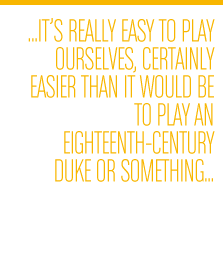 |
|
|||||||
|
stated: By day, you’re on the Cracked writing staff. Some of you have experience with stand-up and other performance, but “acting” is not your primary focus, right? Taking your real-life behind-the-scenes roles into an on-screen extension is definitely unique. What has the process been like of growing into After Hours? Was it strange to be in front of the camera or a natural progression? You’re right that acting is not our primary focus, insofar as no one on the cast only acts, though all of us come from strong acting backgrounds. Through other sketches and series we’ve done for Cracked, and even through films and performances we’ve done outside the site, we all had a pretty good sense of what we were getting into even before the first episode. We also had a vague sense of the four types of characters we wanted in the show from the very beginning because we felt that these four personality types would offer well-rounded arguments for each topic. In reality, the four of us are more of a combination of every one of the characters, so it was just a matter of whittling out the most important attributes of each person and then scrapping the rest to create four distinct voices. In that sense, it’s really easy to play ourselves, certainly easier than it would be to play an eighteenth-century duke or something (that being one of the initial directions we’d planned to take the show in). stated: That would be interesting to see. How much like yourselves are your “characters”? They’re more like exaggerated archetypes based on caricatures of us. So what is that, three layers of metaphorical separation? The characters’ primary traits are certainly based on a real facet of each person, but they’re wildly exaggerated. We also shaped the characters’ voices around the idea that we wanted four distinct types of arguments each episode, so there’s fudging inherent in that process. In our weird comedy hive-mind, though, Dan makes the most cut and dried, fact-based (read: nerdiest) arguments, Katie makes the darkest, most cynical, and human nature-related arguments, Soren makes the most abstracted, philosophical points (as his life of privilege and handsomeness distances himself from day-to-day reality and the woes of the common), and Michael wants to eat or have sex with stuff, and hopes there’s an explosion. He’s the dumb id, and often a handy wildcard slot. Since we come up with the arguments first, and they aren’t originally tied to any character in particular, we found these guidelines really helped distinguish one voice from another. |
||||||||
|
stated: When writing After Hours, do you sit and have a conversation similar to the flow of an episode, or does one of you attempt to write the whole episode? What is the creative process? When we create a new episode, all the writers and the director, Justin Viar, will get in a room together and have a conversation where we come up with the seeds of the arguments you see in the final episode. The difference is that the episodes are about six minutes long, while the meeting is usually about three or four hours. Someone will either come in with a topic and three or four great arguments for it, or it will be as simple as someone saying, “I want to do an episode about vampires,” and then we sit around pulling out the points we think are most interesting about the subject and arguing over them. Once we have the bare bones of an episode, usually the person who brought in the idea or who feels the most passionately about it will go off an write the episode based on what we discovered in the meeting. We’ll usually try to match the arguments to the personality types in the scriptwriting process so we never end up in a situation where we think, “Well, that doesn’t sound like something Michael would say.” After that, we’ll bring it back for another meeting and come up with more jokes and we’ll decide on the animations, or we’ll cut anything that doesn’t make sense. Then we recite it in a different room and film that, while sitting. stated: Which one of you has the biggest ego? Please tell us why you are so amazing. Soren Bowie has the biggest ego and rightfully so because of his spectacular imagination. He is a rocket of knowledge and creativity speeding through the cosmos past the flashbulb lights of millions of stars, all focused directly on him, waiting to see what he will do next. We are not just lucky to have him on our team, the world is lucky to have him on its team. He exemplifies what we all aspire to be, the culmination of thousands of years of human evolution. And when he smiles you can tell, you can just tell, he never even had wisdom teeth. Yes, Soren is a magic spaceship of excellence. stated: Who is the smartest among you? Prove it. Michael Swaim, because he can guess which of the Cracked staffers wrote the answer to the previous question by doing nothing but reading the answer to the next one. And his heart is a calculator. It says “80085.” |
||||||||
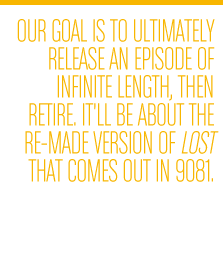 |
|
|||||||
|
stated: Which one of you is most likely to let celebrity go to your head? (AKA, the most insecure.) Soren Bowie. We let him write that excerpt about himself in the ego question. He’s too far-gone to save. stated: Are the illustrations and animations created after the episode is edited? Who is the artist or artists? Illustrations are begun as soon as we’ve locked the script, and then Cody Johnston animates them brilliantly as fast as the equally brilliant artists can get them in. Those artists are Matt Barrs (who illustrates anything Soren imagines), Bret Herholz (who does the same for Katie), Anthony Clark (Dan), and Winston Rowntree (Michael). stated: Clearly your audience is responding to the show, judging from the number of views your videos are regularly receiving. How does After Hours engage your audience with the Cracked website and community? Was that the plan all along or a nice side effect? After Hours for us is our stab at making videos in the same spirit as the articles. We’ve always been known for our articles and that’s how most people discover the site. But with After Hours, we can still isolate and analyze a piece of pop culture like Ninja Turtles or Star Wars the same way we would in an article, but all the points can move a lot faster when they can build between four people saying the lines. Plus we have the added bonus of animations, which help illustrate the points we’re making even better. Keeping consistent with the sensibility of our articles was important to us. That’s part of the reason we wanted it to be editors sitting around talking after work; the more we could ground it in what everybody already loved about the site, the better chance we would have of success. The added bonus we never anticipated was that people would start siding with one particular character over the others. People started to relate to one character or another, which was nice for us because it meant that even if one of us didn’t “win” the argument, there were still people watching who agreed wholeheartedly with you. |
||||||||
 |
||||||||
| (Soren Bowie and Daniel O’Brien) | ||||||||
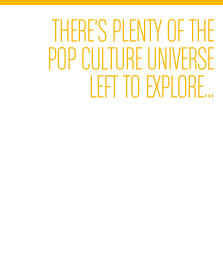 |
|
|||||||
|
stated: What’s next for the show? Would you ever consider a longer format? We’re stepping it up in phases. We’re going to release a ten-minute episode, then a twelve, then a fourteen. Our goal is to ultimately release an episode of infinite length, then retire. It’ll be about the re-made version of Lost that comes out in 9081. Or else we’re just going to keep making them as they are indefinitely until the fans stop enjoying them. There’s plenty of the pop culture universe left to explore, and we like the format we’ve got quite a bit. If an enticing offer to turn the show into one of a longer format were to come along, we’d debate the merits of that plan then, and probably do a significant amount of nit-picky retooling to expand it and bring it up to code. That’s kind of our thing. stated: Ok, smart guys. Let’s see how you do completing these analogies… law : anarchy :: After Hours is to… Casual Pondering hunger : thirst :: After Hours is to… Nostalgia love : heartache :: After Hours is to… A small pile of loose change on a bus seat. Okay, so maybe analogies aren’t our strong suit. We aced the math section, though. We got tons of points on that one…however many is a good score. |
||||||||
 |
||||||||
| (Michael Swaim and Katie Willert) | ||||||||
|
|
|
|||||||
|
Visit the Cracked After Hours team at: |
||||||||









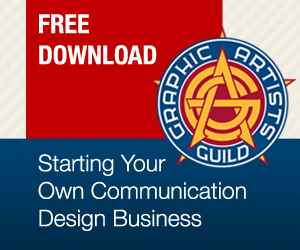
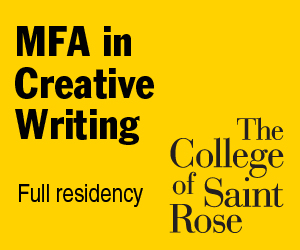
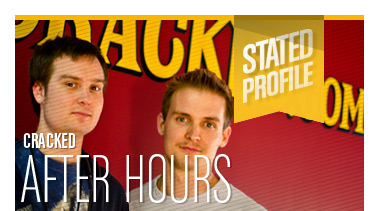
 Scott Chappell
Scott Chappell
Reader Comments